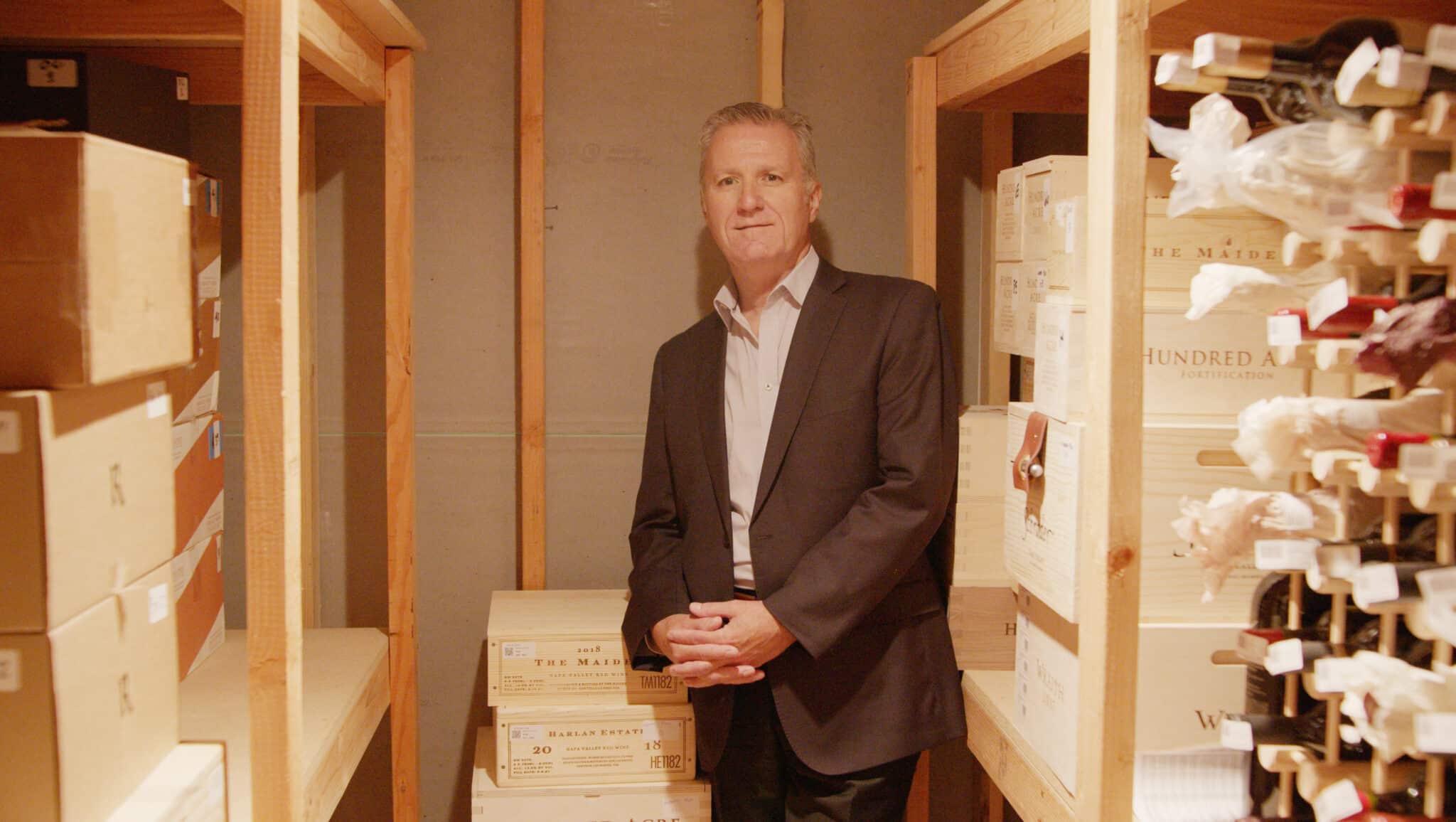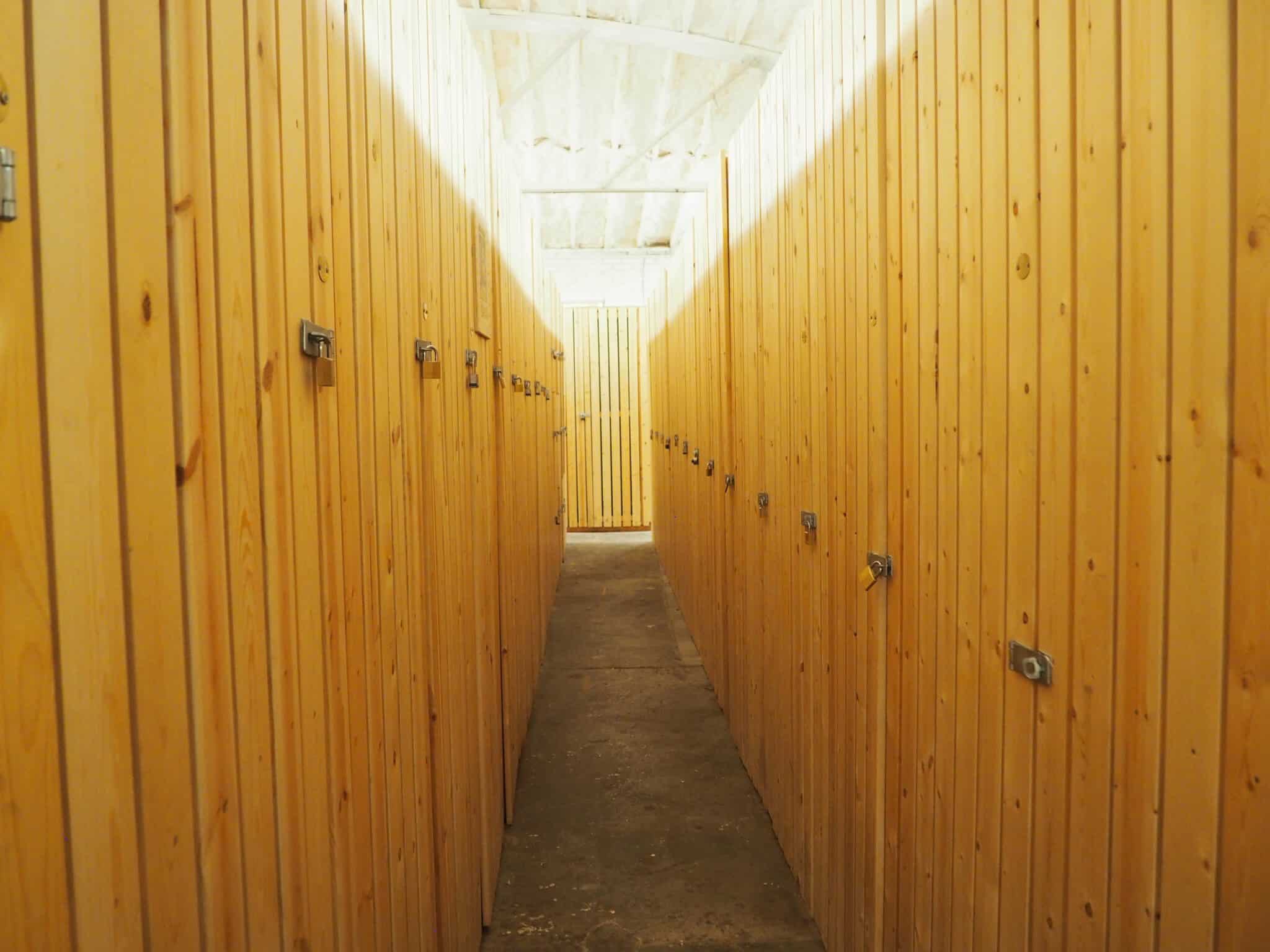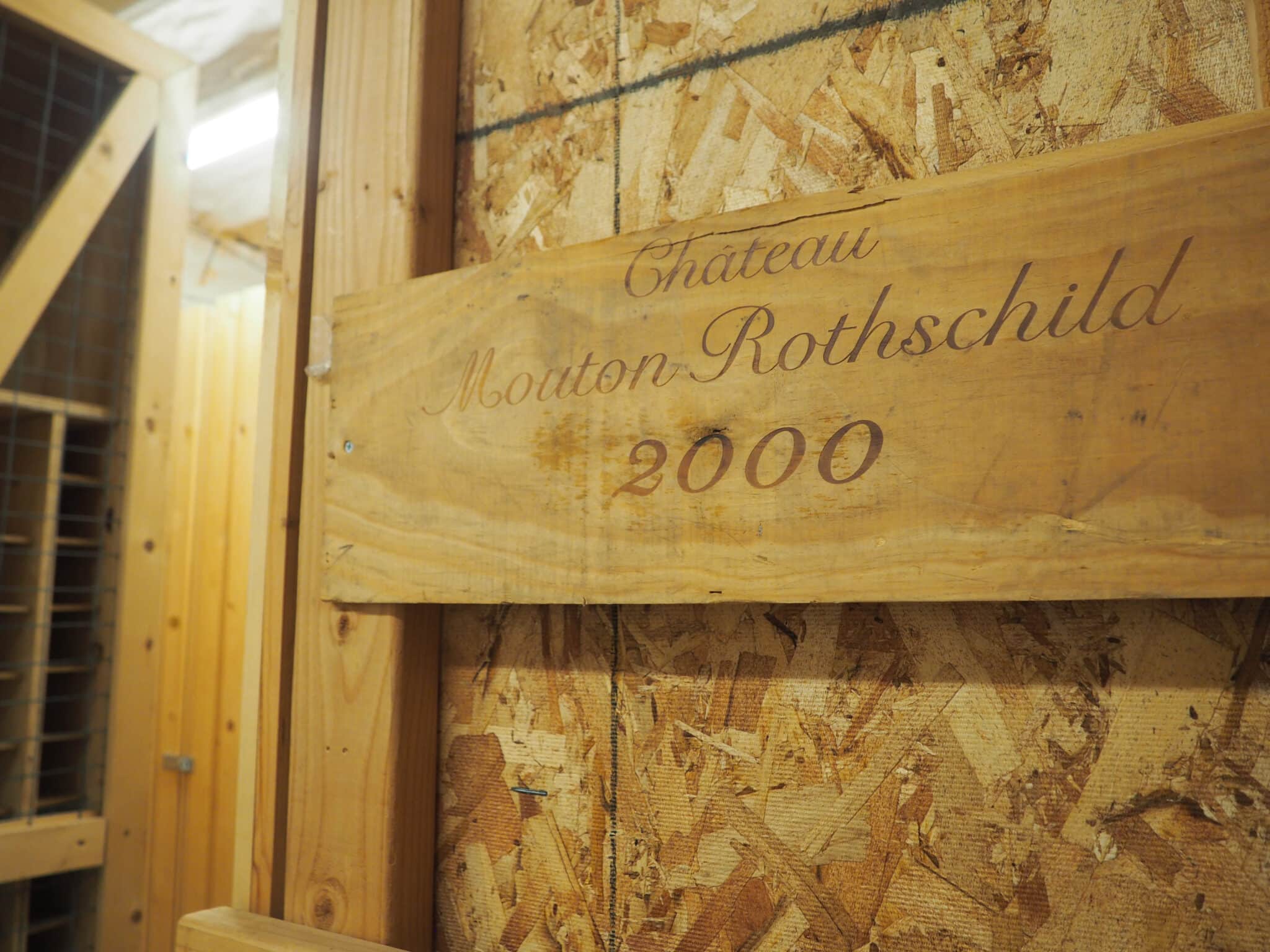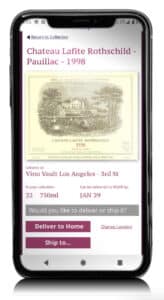
Jeff Anthony is CEO of Vino Vault. His company acquired Wine Storage of Denver earlier this month. (Photo courtesy of Vino Vault)
A local wine storage company has been given a perfect reason to dust off some old bottles to celebrate.
After 22 years in business, Wine Storage of Denver at 357 Santa Fe Drive has been acquired by Vino Vault, a firm that launched last year. The deal gives Vino Vault six locations, joining three in Los Angeles and one each in Dallas and New York.
The parties did not disclose financial terms of the deal, though Vino Vault CEO Jeff Anthony said his company “paid a very fair price.” WSD has adopted the Vino Vault name.
Anthony plans to bring new technology to the facility, ranging from additional security and climate control measures to an inventory management tool that lets customers view and auction their collection.
WSD was founded in 2000 by four members of the Chaney family. Tom Chaney saw a wine storage facility in Seattle and decided to start something similar in Denver, opening the physical facility two years later. In 2014, the company moved from its original location on Kalamath Street to its current space on Santa Fe Drive, purchasing the building for $600,000, records show.
The sale to Vino Vault did not include the real estate, which the company is now leasing from the Chaney family.
‘Our clients are going to benefit from it greatly’
Rachel Chaney — Tom’s daughter-in-law, and the company’s primary manager prior to the sale — said the family had received offers in the past, and didn’t take them too seriously. But Vino Vault made an offer they couldn’t refuse.
“Vino Vault captured our attention because of their background in preserving fine assets,” Chaney said. “They brought some really cool ideas to the table and we think that where they’re going to take this is a really wonderful direction, and clients are going to benefit from it greatly.”
Anthony said that there are roughly 131 wine storage facilities in the U.S., and Vino Vault has been eyeing growth through acquisitions.
“We’ve really contacted virtually all of these 130 storage facilities. It just so happened that we made contact with Rachel Chaney,” he said. “Early on, probably 18 months ago, they expressed a real interest in doing something with us. So, we simply moved them to the top of the list.”
Wine storage is a high-income oriented market, where customers see wine itself as an asset class, similar to cars or art. Denver in particular was selected by Vino Vault for expansion due to its concentration of wealth, as well as easy access to ski towns like Aspen and Vail, Anthony said.
“Colorado has really nice characteristics in terms of concentrations of wealth … something similar to maybe an Oregon or Washington,” Anthony said.
The wealthier the client, the more likely they are to work with Vino Vault, Anthony said.
“Like any other collector, whether it’s a collector of art, a collector of wine, a collector of cars, at some point you outgrow your garage, you outgrow your wine cellar because you’re a collector, and you just keep collecting and collecting and collecting,” Anthony said. “I would say without question, our demographic would be more geared towards people who have their own wine cellars.”
Anthony said the purchase of Chaney’s business puts Vino Vault in position to become the largest wine storage operator in the world, because the industry is very fragmented.
“There is one market leader in the wine storage space, and they have six locations and they’ve been at this for about 20 years. We’ve been at this for two years. We already have six locations and we’re about to announce our seventh. So either next month or certainly by August or September, we will be the largest wine storage provider in the world,” Anthony said.
Smallest locker costs $29 a month
Storing wine today is essentially mimicking the ancient caves where bottles were stored before climate controlled buildings, Chaney said.

The storage facility is kept at 55 degrees Fahrenheit while maintaining between 65-67 percent humidity.
The storage facility is kept at a brisk 55 degrees Fahrenheit while maintaining between 65-67 percent humidity; a closed-cell foam insulation that covers the inside and roof of the building helps maintain a regulated climate. Motion sensored LED lights dot the ceiling as a means to limit UV exposure.
Security is also a critical part of the facility’s operations. The business has a nondescript storefront with simple signage that doesn’t indicate the building’s purpose. Cameras are spread out along the inside and outside of the building.
The wine itself is stored in cases of 12 bottles placed either in a standardized wooden locker or customizable walk-in, pallet or rack storage. WSD had been charging for the space, not by the case: an eight-case locker, the smallest available option, costs $29/month; 16- and 24-case lockers cost $58/month and $79/month, respectively. Those with larger collections can have custom built storage options at customizable prices.
Chaney said that all Vino Vault locations are unique and operate somewhat differently with respect to pricing. Anthony did not specify if the pricing structure of the Denver location will change, although he noted “we have to keep up with inflation.”
With around 2000 customers nationwide, Vino Vault’s average customer has about 50 cases of wine, with the Denver facility currently at roughly 85 percent of its storage capacity, according to the company. By “densing up” square footage, Anthony expects to free up more space — taking capacity down to approximately 75 percent, he said.
Vino Vault’s pitch to WSD were the proprietary features and amenities that it offers customers. Anthony said security, monetization, inventory and transport were some of the key factors that make his company stand out:
- • Security: “Backup generators in the case that when you have a power outage, we need to make sure that the air conditioning, the humidity control, are all continuously running.”
- • Monetization: “We have an auction place platform and a marketplace platform which allows our customers to monetize their inventory. This is unique to the entire industry to be able to take what you’ve been collecting through the years and now monetize it.”
- • Inventory: “Allowing customers on their laptop to view their inventory … a lot of these customers have been collecting for decades – 10, 20, 30 years ago. They sometimes forget what they bought 20 years ago.”
- • Transport: “(If your wine) needs to move somewhere, either to your home or an auction house, you’re using a Vino Vault truck or an approved Vino Vault truck to transport that really valuable wine from point A to point B.”
Ultimately, Anthony said he wants Vino Vault to be a one stop shop for wine storage, so that every element of the process is managed by the company.
In addition to the amenities above, Vino Vault focused on continuity with its purchase of WSD, Chaney said. They’ll be retaining the facility’s operational manager and Chaney will continue with the business during the transition as a consultant.
“I really believe what we’re doing is completely revolutionary,” Anthony said.
Brooks Marsted, owner of Corkscrews Wine Storage and WSD’s largest competitor, disagrees.
“We’ve already been doing the things they’re (Vino Vault) coming in to do,” he said.
Marsted runs three wine storage locations, in Denver, Boulder and Centennial. He said he has no plans for expansion outside Colorado and would like to remain locally owned and operated.
Though he now has to face a much larger competitor in Vino Vault, Marsted remains optimistic about his business.
“Competition is good for the consumer,” he said. “We’ll just have to dig deep and become better operators.”

Jeff Anthony is CEO of Vino Vault. His company acquired Wine Storage of Denver earlier this month. (Photo courtesy of Vino Vault)
A local wine storage company has been given a perfect reason to dust off some old bottles to celebrate.
After 22 years in business, Wine Storage of Denver at 357 Santa Fe Drive has been acquired by Vino Vault, a firm that launched last year. The deal gives Vino Vault six locations, joining three in Los Angeles and one each in Dallas and New York.
The parties did not disclose financial terms of the deal, though Vino Vault CEO Jeff Anthony said his company “paid a very fair price.” WSD has adopted the Vino Vault name.
Anthony plans to bring new technology to the facility, ranging from additional security and climate control measures to an inventory management tool that lets customers view and auction their collection.
WSD was founded in 2000 by four members of the Chaney family. Tom Chaney saw a wine storage facility in Seattle and decided to start something similar in Denver, opening the physical facility two years later. In 2014, the company moved from its original location on Kalamath Street to its current space on Santa Fe Drive, purchasing the building for $600,000, records show.
The sale to Vino Vault did not include the real estate, which the company is now leasing from the Chaney family.
‘Our clients are going to benefit from it greatly’
Rachel Chaney — Tom’s daughter-in-law, and the company’s primary manager prior to the sale — said the family had received offers in the past, and didn’t take them too seriously. But Vino Vault made an offer they couldn’t refuse.
“Vino Vault captured our attention because of their background in preserving fine assets,” Chaney said. “They brought some really cool ideas to the table and we think that where they’re going to take this is a really wonderful direction, and clients are going to benefit from it greatly.”
Anthony said that there are roughly 131 wine storage facilities in the U.S., and Vino Vault has been eyeing growth through acquisitions.
“We’ve really contacted virtually all of these 130 storage facilities. It just so happened that we made contact with Rachel Chaney,” he said. “Early on, probably 18 months ago, they expressed a real interest in doing something with us. So, we simply moved them to the top of the list.”
Wine storage is a high-income oriented market, where customers see wine itself as an asset class, similar to cars or art. Denver in particular was selected by Vino Vault for expansion due to its concentration of wealth, as well as easy access to ski towns like Aspen and Vail, Anthony said.
“Colorado has really nice characteristics in terms of concentrations of wealth … something similar to maybe an Oregon or Washington,” Anthony said.
The wealthier the client, the more likely they are to work with Vino Vault, Anthony said.
“Like any other collector, whether it’s a collector of art, a collector of wine, a collector of cars, at some point you outgrow your garage, you outgrow your wine cellar because you’re a collector, and you just keep collecting and collecting and collecting,” Anthony said. “I would say without question, our demographic would be more geared towards people who have their own wine cellars.”
Anthony said the purchase of Chaney’s business puts Vino Vault in position to become the largest wine storage operator in the world, because the industry is very fragmented.
“There is one market leader in the wine storage space, and they have six locations and they’ve been at this for about 20 years. We’ve been at this for two years. We already have six locations and we’re about to announce our seventh. So either next month or certainly by August or September, we will be the largest wine storage provider in the world,” Anthony said.
Smallest locker costs $29 a month
Storing wine today is essentially mimicking the ancient caves where bottles were stored before climate controlled buildings, Chaney said.

The storage facility is kept at 55 degrees Fahrenheit while maintaining between 65-67 percent humidity.
The storage facility is kept at a brisk 55 degrees Fahrenheit while maintaining between 65-67 percent humidity; a closed-cell foam insulation that covers the inside and roof of the building helps maintain a regulated climate. Motion sensored LED lights dot the ceiling as a means to limit UV exposure.
Security is also a critical part of the facility’s operations. The business has a nondescript storefront with simple signage that doesn’t indicate the building’s purpose. Cameras are spread out along the inside and outside of the building.
The wine itself is stored in cases of 12 bottles placed either in a standardized wooden locker or customizable walk-in, pallet or rack storage. WSD had been charging for the space, not by the case: an eight-case locker, the smallest available option, costs $29/month; 16- and 24-case lockers cost $58/month and $79/month, respectively. Those with larger collections can have custom built storage options at customizable prices.
Chaney said that all Vino Vault locations are unique and operate somewhat differently with respect to pricing. Anthony did not specify if the pricing structure of the Denver location will change, although he noted “we have to keep up with inflation.”
With around 2000 customers nationwide, Vino Vault’s average customer has about 50 cases of wine, with the Denver facility currently at roughly 85 percent of its storage capacity, according to the company. By “densing up” square footage, Anthony expects to free up more space — taking capacity down to approximately 75 percent, he said.
Vino Vault’s pitch to WSD were the proprietary features and amenities that it offers customers. Anthony said security, monetization, inventory and transport were some of the key factors that make his company stand out:
- • Security: “Backup generators in the case that when you have a power outage, we need to make sure that the air conditioning, the humidity control, are all continuously running.”
- • Monetization: “We have an auction place platform and a marketplace platform which allows our customers to monetize their inventory. This is unique to the entire industry to be able to take what you’ve been collecting through the years and now monetize it.”
- • Inventory: “Allowing customers on their laptop to view their inventory … a lot of these customers have been collecting for decades – 10, 20, 30 years ago. They sometimes forget what they bought 20 years ago.”
- • Transport: “(If your wine) needs to move somewhere, either to your home or an auction house, you’re using a Vino Vault truck or an approved Vino Vault truck to transport that really valuable wine from point A to point B.”
Ultimately, Anthony said he wants Vino Vault to be a one stop shop for wine storage, so that every element of the process is managed by the company.
In addition to the amenities above, Vino Vault focused on continuity with its purchase of WSD, Chaney said. They’ll be retaining the facility’s operational manager and Chaney will continue with the business during the transition as a consultant.
“I really believe what we’re doing is completely revolutionary,” Anthony said.
Brooks Marsted, owner of Corkscrews Wine Storage and WSD’s largest competitor, disagrees.
“We’ve already been doing the things they’re (Vino Vault) coming in to do,” he said.
Marsted runs three wine storage locations, in Denver, Boulder and Centennial. He said he has no plans for expansion outside Colorado and would like to remain locally owned and operated.
Though he now has to face a much larger competitor in Vino Vault, Marsted remains optimistic about his business.
“Competition is good for the consumer,” he said. “We’ll just have to dig deep and become better operators.”


